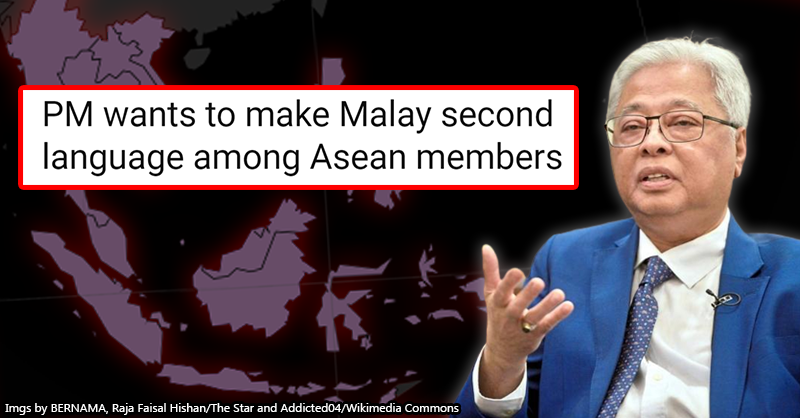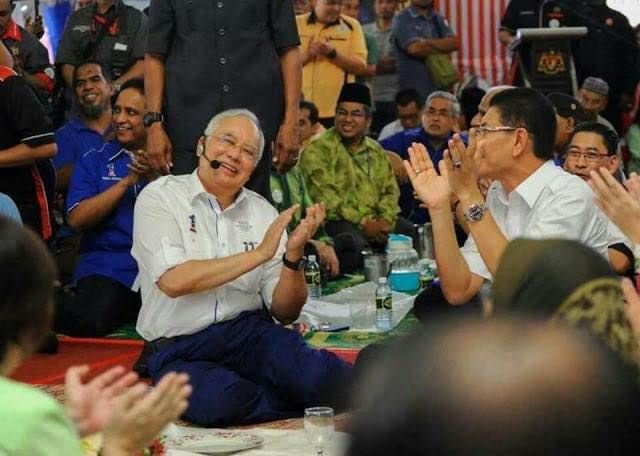Why Ismail Sabri’s plan to make BM as ASEAN’s 2nd language may not be such a bad idea.

- 344Shares
- Facebook332
- LinkedIn2
- WhatsApp10
In recent news, Prime Minister Ismail Sabri was reported as saying that he will talk with ASEAN leaders about making Malay (or Bahasa Melayu) the group’s second language.
“…so there is no reason why we cannot make Bahasa Melayu as one of the official languages of ASEAN. We will coordinate on this matter and I will discuss with the leaders of countries that do use Bahasa Melayu so that they agree to make it the second language of ASEAN,” – Ismail Sabri, as quoted by FMT.
With a track record of wanting private companies and GLCs to use more Malay late last year, it’s easy to see this recent thing as yet another one of Ismail Sabri’s bahasa promotion, and the idea was met with much mockery by netizens.

A random sampling of haters.
For those of you not quite familiar with the term, ASEAN (formally the Association of Southeast Asian Nations) is a political and economic union of 10 southeast Asian member states – Malaysia, Brunei, Cambodia, Indonesia, Laos, Myanmar, the Philippines, Singapore, Thailand and Vietnam. As for their languages, there are at least 1,000 spoken throughout ASEAN territory, with Cambodia, the least linguistically diverse member country, speaking 23 local languages on top of their national language.
Despite that, English had been the only working language used by ASEAN since its establishment in 1967. With that in mind, the notion of asking other ASEAN members to suddenly speak Malay may be craptacularly ridonkulous to some, but it didn’t stop several Malaysian politicians from coming up with the idea over the years.
Yep, that’s right…
This isn’t just an Ismail Sabri™ original idea
Perhaps the earliest instance of this we’re willing to look at was in 2011, when the then Minister of Information, Communication and Culture Rais Yatim, suggested that the Malay language be used as an official language in the southeast Asian region. The proposal came during a visit to Indonesia, and it aimed to put the Malay language on the same level as other world languages.
“It’s very good that we try to put Malay language side by side with German, French, Arabic, so that it becomes a lingua franca… Malay is quite rich,” – Rais Yatim, as reported by VivaNews (archived).
In 2015, when Malaysia was ASEAN’s chair, the then Communications and Multimedia Minister Datuk Seri Salleh Said Keruak had said during a Malay language seminar that to form a community, ASEAN should use a homogenous language, and he volunteered Bahasa Melayu as a tribute.
“Malaysia should take this opportunity to promote Malay as one of the main characteristics of the ASEAN community. We need to show that the Malay language is a relevant and dynamic language that can act as the ASEAN language,” – Salleh Said Keruak, as reported by Malay Mail.

Speaking of relevant and dynamic… Img from Najib Razak’s Facebook.
Najib Razak had also pushed the idea forward before GE14, when he in 2017 expressed his wish that Bahasa Melayu become ASEAN’s main language and one of the world’s major mediums. The most recent one we can find was the Ismail Sabri one, but perhaps unsurprisingly, this wasn’t the first time he had the idea: he also mentioned it back in 2011, when he was Domestic Trade, Cooperatives and Consumerism Minister.
In short, thinking that Asean member countries should be using Malay isn’t really a novel idea, but getting to the main reason of why you clicked on this article…
So why isn’t it a totally dumb idea?

Another Ismail Sabri image, since we can’t have all gifs. Img from Bernama, via Astro Awani.
For one thing, unlike past suggestions, Ismail Sabri had this time used the term ‘second language‘. We should also note that instead of an official language, the ASEAN charter only provides for English as a working language. The difference is that all of an organization’s documents should be made available in the official language(s), while the working language(s) are for internal communication. Judging by his quote from above, he either
- thought that English was ASEAN’s official language and wants Malay to be an additional official language, or
- wants Malay to be a second working language for ASEAN
…neither of which will replace English, so the suggestion may not be that weird. Other regional organizations do have multiple official and working languages – the Europian Union recognizes 24, while the United Nations recognize 6. It probably won’t hurt for ASEAN to have more working languages, and adding a southeast Asian language to the list might help with the Asean identity.
As for why Malay specifically, the most commonly quoted pro is its commonness: variations of Malay/Indonesian are spoken in several Asean countries – Indonesia, the largest one, as well as Malaysia, Singapore, Brunei, and southern Thai. Malay is quite probably the easiest to pick up, being listed as the easiest southeast Asian language to learn by several sites. It boasts a simple roman script, straightforward pronunciation in most cases, simple grammar rules, and the vocabulary should be familiar to some non-speakers, since many are borrowed.

There’s even a WikiHow article on it!
So with all these said, it’s not a completely crackhead idea to suggest, but still…
Based on previous commentaries, it’s highly improbable
Because the issue had been brought up quite a few times in the past, people have already pointed out the problems surrounding the suggestion. For one thing, if we do pick Malay, then we’ll have to decide whether it’ll be Indonesian Malay or Malaysian Malay. While we can pretty much understand each other, the actual differences can be quite big, with one having Dutch remnants, the other British. Picking one over the other would be a tough issue, and whichever gets picked, some relationships will be at risk.
“These language differences still have historical meaning. This is important in a region with long, proud histories, where Malaysians and Indonesians have had cultural disputes over the origin of batik, rendang and traditional dances.” – Edmund Sim, of the National University of Singapore, as written in his blog.

Although the disputes are sometimes entertaining. Img and backstory can be found at Stomp.
Asean countries that don’t normally speak Malay also probably won’t be too happy about Malay being put on a pedestal. Because while some may see English – the language currently being used in Asean – as foreign, it’s also neutral. No one Asean country can claim that it’s theirs, so having everyone use the language won’t imply any country as more dominant than the others.
“The adoption of any part of a specific Southeast Asian language as the official language would stir political backlash from other ASEAN communities, which may interpret the move as a form of political and cultural dominance. Arguably, the English language might be a non-native language of a former colonial power in the region, but this “neutral” attribute serves to unite ASEAN’s diverse socio-cultural make-up, providing a level political playing field for all member states.” – Dr Tang Siew Mun, then Head of the Asean Studies Centre, ISEAS.
Then there’s the problem of some having to learn a new language, which is a lot harder than it sounds. At the moment, many locals in Thailand can’t even speak English yet. Would it be worth their time to learn Malay, instead of English which they can use with more people? What will they gain by adopting Malay and using it for Asean meetings? If we ask our leaders to learn Thai because it became an Asean language, would they do it?

Probably not, and click image for exhibit A.
And finally, will all these troubles be worth it? While Ismail Sabri said that there’s no reason why we can’t make Bahasa Melayu one of the official languages of Asean, there’s no solid reason why we should, either, other than ‘elevating the mother tongue at the international level‘. Perhaps these are some of the issues and questions that we need to address, before we go around re-suggesting such things.
- 344Shares
- Facebook332
- LinkedIn2
- WhatsApp10






